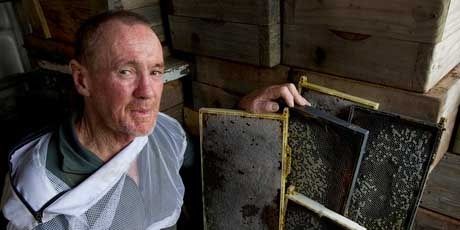Kiwithrottlejockey
Admin Staff
XNC2 GOD

Posts: 32250
Having fun in the hills!
|
 |
« on: September 20, 2012, 02:35:11 am » |
|
Beekeeper watches city hives fall silentBy PETER CALDER - The New Zealand Herald | 9:30AM - Wednesday, September 19, 2012 Kerry McCurdy says hives across Auckland are collapsing. — Photo: Brett Phibbs.THE HINGED LID of the hive swings up with a creak. I could swear the air tightens with anticipation. But if so, it's all mine; Kerry McCurdy isn't expecting any surprises. He knows he'll find either dead bees or no bees, because that's what he's been finding, week after week, for two long months. Kerry McCurdy says hives across Auckland are collapsing. — Photo: Brett Phibbs.THE HINGED LID of the hive swings up with a creak. I could swear the air tightens with anticipation. But if so, it's all mine; Kerry McCurdy isn't expecting any surprises. He knows he'll find either dead bees or no bees, because that's what he's been finding, week after week, for two long months.
The two hives, beneath the fig tree and among the blazing orange clivia flowers, are not the classic shape, like the ones on the matchboxes, or the stacked wooden boxes we are all familiar with; they're long, lidded plywood chests, big enough to accommodate several dozen of the frames that bees will pack with honey.
For the past three years they've yielded 30kg each summer, and even in the depths of winter, when the colony of maybe 50,000 has been eating through its own stores, there's been a warm hum around the single entrance hole. Now, nothing.
McCurdy peels the plastic cover off the top of the frame-rack and levers each frame up in turn. "This one's been robbed out," he says, pointing to the indentations left by infiltrators from another hive that cleared every drop of the sweet contents.
A small brood of young, walled into their waxy cells, proves the hive hasn't been abandoned — "sometimes, there's not a bee anywhere and it's like they've swept the floor before they left," says McCurdy — but rather that the colony has succumbed to varroa mite. The weakened foragers have failed to make it back; the hive-robbing marauders have come and gone, in the process almost certainly taking the mite with them. The plague spreads.
"That brood is history," says McCurdy's son Oliver. "They have no other bees to bring them food, keep them warm." All the pair can do is repopulate the hive when the weather gets warmer, and hope.
Across the region — which he refers to as "my farm, with millions of workers who don't want wages" — McCurdy has about 300 hives. He sites them in people's backyards, charging them for the privilege. Householders get about 20kg of honey a year and the satisfaction of knowing that they're pollinating the neighbourhood. Or were. Now about 70 per cent of his hives have fallen silent.
"The phone started ringing two months ago," he says, "and it hasn't stopped since. And the scary thing is that it's all of Auckland, from the top to the bottom."
Scarier still is that different hives show different signs; there is no obvious universal, epidemic cause. That's why he fears that the city hives could be in the grip of colony collapse disorder.
His next two hives are barely 500m north as a bee flies. One has been robbed out; the other is untouched but abandoned. A kilometre to the west, one hive is silent, another apparently active.
McCurdy stands in the humming blizzard of bees around the open hive, inspecting frames in the sunlight. "Bees like me," he explains when I ask why he's hatless and gloveless. "I can work around a lot of people in hats and suits and not get stung. If I wear a hat, I get stung."
But the pair are sceptical that the active hive will survive. "There's no brood there and no sign of a queen," says the younger man. "The next two weeks will tell but it doesn't look good."
McCurdy knows that the beekeeping establishment regards him as something of a crank ("I've been called a cowboy," he says). One of his clients swears he once said "bees are people too"; I certainly heard him say "bees are smarter than people". He uses dowsing rods to decide where to locate his hives, a practice he admits is unknown internationally.
There's no dispute that garden insecticides containing neonicotinoid chemicals are killing bees, but McCurdy also blames cellphones, GPS systems and in-car computers, which are "showering the Earth and the magnetic lines bees use to navigate".
What is indisputable is that city hives — of which he is the biggest operator — are in sudden, serious trouble and no one knows exactly why. Official testing regimes, he says, focus on industrial-scale beekeepers and ignore him because "they see the city beekeepers as hobbyists".
"This is our backyard, mate. This is where we live. This is where our kids and grandkids eat plums and feijoas. If we just sit here paddling away, we're going to go over the edge. And one day we'll wake up and there'll be no bees, no flowers, no fruit."http://www.nzherald.co.nz/opinion/news/article.cfm?c_id=466&objectid=10835020
|